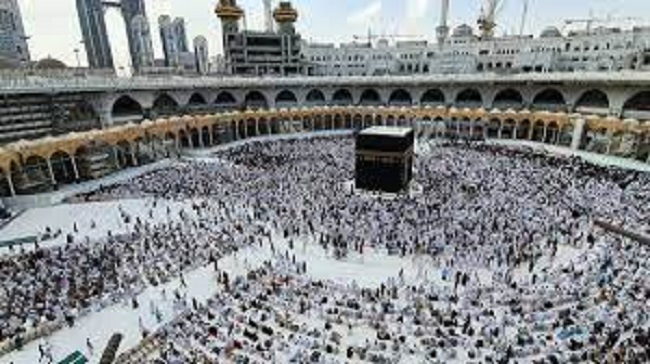AMIDST unstable foreign exchange rates, the National Hajj Commission of Nigeria (NAHCON), on Saturday, announced fares for this year’s Hajj in the Kingdom of Saudi Arabia with a 100 percent increment on what was paid for the 2023 edition.
Unlike the N2.8 million and N2.9million paid by those who participated in the spiritual exercise last year from the North and South respectively, NAHCON announced fares of N4.8million for the South and N4.6million for the North for this year’s Hajj.
The Hajj body, in a statement signed by its Assistant Director, Public Affairs, Fatima Sanda Usara, made available to Sunday Tribune in Abuja informed that intending pilgrims from southern states would pay the sum of N4,899,000.
According to Usara, while those from the North were required to pay the sum of N4,699,000, intending pilgrims from Yola and Maiduguri would pay a fee of N4,679,000.
She further advised intending pilgrims to balance their Hajj fare by Monday, February 12, accordingly to enable the commission to transfer the funds before the February 25 deadline.
There were eight categories of fares paid by Nigerians who took part in the 2023 Hajj, with the South having six.
Pilgrims from Maiduguri and Yola paid N2,890,000, while other northern states paid N2,919,000.
In the southern states, Edo State and the other states in the South-South and South-East paid N2,968,000, while Ekiti and Ondo states paid N2,880,000.
While Osun State paid N2,990,000, Cross River paid N2,943,000, and Lagos, Ogun, and Oyo paid N2, 999, 000 respectively.
Explaining the increase in this year’s fare, Usara stated that the free-for-all slide of the naira against the dollar was responsible, stating that NAHCON Chairman/CEO, Malam Jalal Ahmad Arabi, had initially aimed to maintain the 2024 Hajj fare at N4.5 million that was charged as an initial deposit.
According to her, “The prospects had remained high until the well-known naira crash that occurred mid-week.
“Regrettably, the recent instability in the dollar exchange rate compelled a necessary adjustment despite commendable efforts by NAHCON Chairman, Jalal Ahmad Arabi, to maintain the cost of the year’s hajj at the said rate.”
She added that the NAHCON boss had negotiated substantial discounts with service providers in the Kingdom of Saudi Arabia during his visit to the Kingdom last month to alleviate costs for intending pilgrims.
“However, the volatile currency situation within the week necessitated the Commission to take a drastic decision to consolidate the gains achieved in lowering the cost of services for the Hajj, without which the price of the 2024 Muslim pilgrimage might have shot to about N6,000,000 (six million Naira),” she stated.
While expressing his regret over the fares for this year’s Hajj, Usara stated that Arabi said it was the will of Allah, as the Commission had limited time to explore further options for the fares to remain within the range of N4.5 million.
The body then advised all intending pilgrims to pay the balance of their fares by Monday, February 12 to enable the commission to transfer the funds to Saudi Arabia before the February 25 deadline.
The announcement of fares for this year’s Hajj came three days after the January 31 deadline given by the commission for intending pilgrims to make an initial deposit of N4.5 million for the spiritual exercise.
The deposit was to enable the Hajj body to know the number of people from Nigeria who would be participating this year, given the new Saudi Arabian policies on Hajj, effective from this year.
Unlike previous arrangements whereby visas were issued a few days before Arafat, the new policies entail that issuance of visas will close by April 29, giving the Saudi authorities more than 40 days ahead of Arafat Day.
Issuance of visas for various participating countries commences on March 1.
Meanwhile, NAHCON has assured the public of its commitment to ensuring a smooth and successful Hajj pilgrimage for all participants, despite the challenges posed by foreign exchange factors.
Usara said, “The Commission appreciates the understanding and cooperation of the Nigerian Muslim community during these times.”
